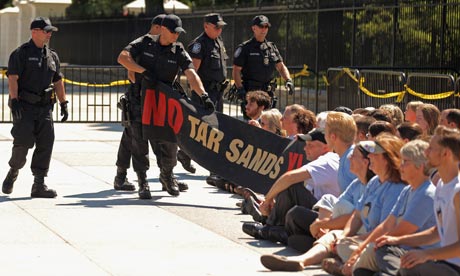 In a post on the Guardian website Bill McKibben reflects on civil disobedience after his stint in jail last weekend. He had thought he might be writing a blog post from jail:
In a post on the Guardian website Bill McKibben reflects on civil disobedience after his stint in jail last weekend. He had thought he might be writing a blog post from jail:
“But frankly, I wasn’t up to it. The police, surprised by how many people turned out on the first day of two weeks of protests at the White House, decided to teach us a lesson. As they told our legal team, they wanted to deter anyone else from coming – and so, with our first crew, they were… kind of harsh.
“We spent three days in D.C.’s Central Cell Block, which is exactly as much fun as it sounds like it might be. You lie on a metal rack with no mattress or bedding and sweat in the high heat; the din is incessant; there’s one baloney sandwich with a cup of water every 12 hours.
“I didn’t have a pencil – they wouldn’t even let me keep my wedding ring – but, more important, I didn’t have the peace of mind to write something. It’s only now, out 12 hours and with a good night’s sleep under my belt, that I’m able to think straight.”
The experience has increased his already strong admiration for Martin Luther King, and he’ll go to this weekend’s big celebrations for the opening of the Martin Luther King Jr. National Memorial on the Washington Mall with even more respect for King’s calm power.
“Preacher, speaker, writer under fire, but also tactician. He really understood the power of nonviolence, a power we’ve experienced in the last few days.”
McKibben writes that the police crack-down brought publicity that cemented two of the main purposes of the protest. First, it made the pipeline into a national issue and highlighted the danger it poses to the planet. The message of that danger is getting through, in evidence of which McKibben cites a strong New York Times editorial opposing the pipeline that he was handed on his release from jail. Second, being arrested in front of the White House helped make it clearer that President Obama should be the focus of anti-pipeline activism:
“Barack Obama has the power to stop it and no one in Congress or elsewhere can prevent him from doing so. That means – and again, it couldn’t be simpler – that the Keystone XL decision is the biggest environmental test for him between now and the next election. If he decides to stand up to the power of big oil, it will send a jolt through his political base, reminding the presently discouraged exactly why they were so enthused in 2008.”
However there’s a deeper message to the protest, one which Dr King the strategist understood well, and that is just how powerful a weapon nonviolence can be.
“The police, who trust the logic of force, never quite seem to get this. When they arrested our group of 70 or so on the first day of our demonstrations, they decided to teach us a lesson by keeping us locked up extra long – strong treatment for a group of people peacefully standing on a sidewalk.
“No surprise, it didn’t work. The next day an even bigger crowd showed up – and now there are throngs of people who have signed up to be arrested every day until the protests end on September 3rd. Not only that, a judge threw out the charges against our first group, and so the police have backed off. For the moment, anyway, they’re not actually sending more protesters to jail, just booking and fining them.”
Over the coming weekend’s celebration of Martin Luther King, McKibben sees the continuing protest and presumably continuing arrests as “a kind of living tribute”:
“While people are up on the mall at the monument, we’ll be in the front of the White House, wearing handcuffs, making clear that civil disobedience is not just history in America.
“We may not be facing the same dangers Dr. King did, but we’re getting some small sense of the kind of courage he and the rest of the civil rights movement had to display in their day – the courage to put your body where your beliefs are. It feels good.”
Civil disobedience in support of climate change action seems to me only likely to spread as the intransigence or pusillanimity of governments continues to hinder the steps necessary to drastically reduce greenhouse gas emissions. If little notice is taken of the science, of the public statements, the letters, the submissions, the resolutions, the protests, the petitions, then civil disobedience will play its part in the expression of people’s concern in a matter of great moment for humanity. It puts stress on the body politic, but openly, responsibly and with restraint.
